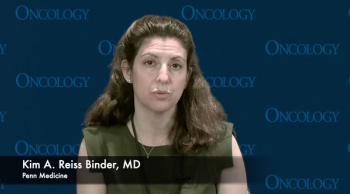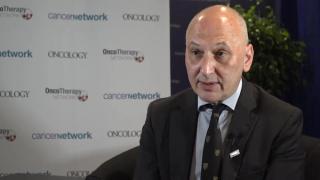
Pancreatic Cancer
Latest News

Latest Videos

More News

Patients with pancreatic cancer may benefit from treatment with ATG-101, which was granted orphan drug designation by the FDA.

An ongoing phase 1 trial is assessing the potential of SY-5609 plus chemotherapy in patients with advanced solid tumors, with the FDA granting orphan drug designation to the combination for patients with relapsed metastatic pancreatic cancer.

At ASCO 2022, Pamela L. Kunz, MD, spoke about a phase 2 trial investigating temozolomide alone and temozolomide plus capecitabine in advanced pancreatic neuroendocrine tumors.

Results from a phase 2 trial of temozolomide or temozolomide plus capecitabine showed promising efficacy of the regimens for patients with advanced pancreatic neuroendocrine tumors.

Results from a phase 3 trial show similar results in regard to overall survival when patients with advanced pancreatic ductal adenocarcinoma were treated with either folinic acid, fluorouracil, irinotecan, oxaliplatin or gemcitabine/nab-paclitaxel in the first line.

Kim A. Reiss Binder, MD, spoke about the phase 1 CARISMA trial which investigated CAR macrophages in HER2-overexpressing solid tumors.

Results from a phase 1b/2 trial indicated that niraparib plus nivolumab yielded superior progression-free survival at 6 months vs niraparib and ipilimumab for patients with platinum-sensitive advanced pancreatic cancer.

Patients with borderline resectable pancreatic ductal adenocarcinoma experienced favorable overall survival following treatment with mFOLFIRINOX alone, with additional hypofractionated radiotherapy showing little benefit.

Kim A. Reiss Binder, MD, spoke about the use of niraparib plus either nivolumab or ipilimumab for patients with platinum-sensitive advanced pancreatic adenocarcinoma.

Patients with pancreatic and extrapancreatic neuroendocrine tumors treated with atezolizumab plus bevacizumab experienced consistent clinical responses and a progression-free survival consistent with other therapies.

Biosignatures data from the PRINCE trial show sophisticated precision approaches may be necessary to optimize chemoimmunotherapy use in pancreatic ductal adenocarcinoma.

At the 2022 American Society of Clinical Oncology Annual meeting, Robert H. Vonderheide, MD, DPhil, and colleagues from the Parker Institute for Cancer Immunotherapy present research into biosignatures of survival with different chemoimmunotherapy regimens for pancreatic ductal adenocarcinoma.

Shubham Pant, MD, on the Future of Treatment of Pancreatic Cancer With Targeted Therapies
Shubham Pant, MD, highlights the importance of tailoring treatment in patients with pancreatic cancer by exploring biomarkers.

Nimotuzumab plus gemcitabine improved overall survival in patients with KRAS wild-type advanced pancreatic cancer, especially in those who did not need surgery for obstruction of a pancreatic bile duct.

Stereotactic body radiotherapy plus pembrolizumab and trametinib could potentially become a novel treatment strategy for patients with locally recurrent pancreatic cancer following surgery.

Christine Chung, DO, spoke with CancerNetwork® about the latest research from the journal ONCOLOGY® about implications of blood-based molecular markers in pancreatic adenocarcinoma.

Surufatinib, a treatment for patients with pancreatic and extra-pancreatic neuroendocrine tumors, received a complete response letter from the FDA.

By analyzing CT scans with artificial intelligence, the development of pancreatic ductal adenocarcinoma may be predicted years before actual diagnosis.

Sotorasib Demonstrates Meaningful Responses in KRAS G12C+ Advanced Pancreatic Cancer
Patients with KRAS G12C–mutated locally advanced or metastatic pancreatic cancer experienced clinically meaningful benefit from treatment with sotorasib .

Although sintilimab improved overall response rates and maintained a tolerable safety profile for patients with metastatic or recurrent pancreatic adenocarcinoma, it did not improve overall or progression-free survival.

Updated results from a cohort of the KRYSTAL-1 trial spotlight the potential of adagrasib for patients with previously treated KRAS G12C¬–mutant gastrointestinal tumors.

Patients undergoing pancreaticoduodenectomy for pancreatic ductal adenocarcinoma experienced a better overall survival when treated with adjuvant chemotherapy.

Characterization of Blood-Based Molecular Profiling in Pancreatic Adenocarcinoma
Molecular profiling is being explored in pancreatic adenocarcinoma as a tool to assist with early detection, prognosis, and patient selection in targeted therapy clinical trials.

CancerNetwork® spoke with Allyson J. Ocean, MD, Diane M. Simeone, MD, Manuel Hidalgo Medina, MD, PhD, and Andrew E. Hendifar, MD, about their recent research into the treatment of pancreatic cancer.

Diane Simeone, MD, spoke to the need to determine which patients are at risk of developing pancreatic cancer, the importance of early detection, and challenges that need to be addressed in order to improve survival.





















































